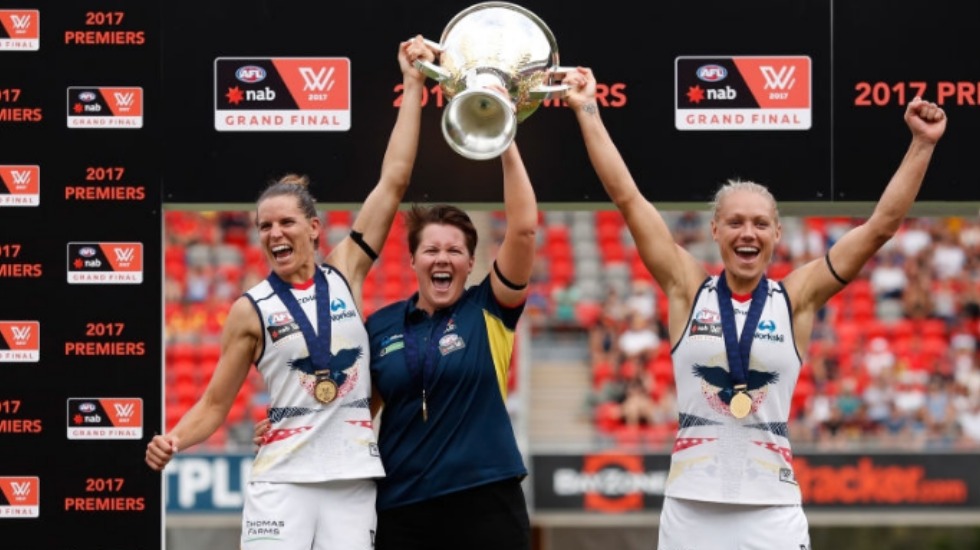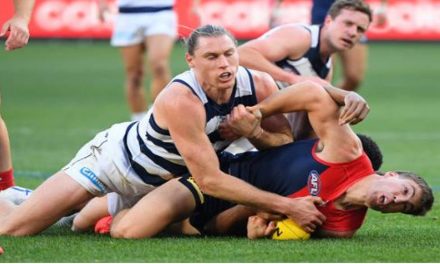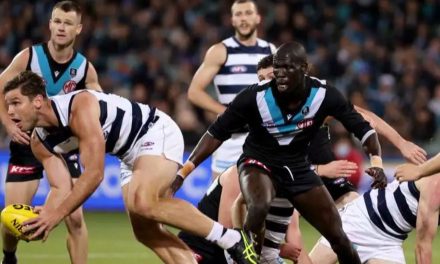Former Adelaide AFLW coach Bec Goddard (centre) lifting the 2017 premiership cup alongside Chelsea Randall (left) and Erin Phillips. Photo: GETTY IMAGES
I whooped with joy last week when the AFL confirmed that Sydney, Hawthorn, Essendon and Port Adelaide would be joining the AFLW competition from 2022-23 onwards.
With the addition of these teams, the women’s league will be complete.
Ahh, I love the smell of progress in the morning.
As the good news was announced, I couldn’t help but think of the trailblazers: the women who played Australian football when it was unfashionable to do so, the women who believed in a national competition, the women who pushed for change long before equality and diversity announced themselves as buzzwords.
We are here because of them.
These football pioneers were mocked, ridiculed and abused for doing what they loved doing. They were sneered at for taking up space, for daring to grab a corner of what was considered men’s territory. Football didn’t fit neatly into a ‘woman’s sphere’. But they played on regardless.
It’s because of Debbie Lee, Lisa Hardeman, Jan Cooper, Nicole Graves, Chyloe Kurdas, and Helen Lambert (who sadly passed away this week), to name but a few, that we have an elite national competition for women – a soon-to-be 18-team competition. And it’s their spirit that flows through AFLW.
The women who play our great game today are unapologetic, strong and proud.
As much as this is rightly being celebrated as progress, it’s a shame that when you look over to the dugout, there isn’t a woman coach in sight.
Heading into season six of AFLW, all 14 clubs will be coached by men.
Bec Goddard will join the ranks as Hawthorn’s inaugural coach more than four years after she coached Adelaide to the inaugural AFLW premiership. Goddard stepped away from coaching, disillusioned and disheartened, after she wasn’t considered for a full-time role at the Crows.
The scarcity of women coaches is not peculiar to the AFL.
In 2019, women made up 24 per cent of CEOs across 63 national sporting organisations and accounted for just 15 per cent of high-performance coaches.
The international sporting scene isn’t any brighter. Only 13 per cent of coaches at the Tokyo Olympics were women. In the Australian team it was 10 per cent.
The lack of women in sport leadership positions is a deeply embedded cultural problem. Sadly, it mirrors what’s happening in the rest of society.
PLEASE HELP US CONTINUE TO THRIVE BY BECOMING AN OFFICIAL FOOTYOLOGY PATRON. JUST CLICK THIS LINK.
The Chief Executive Women (CEW) ASX200 Senior Executive Census 2020 described progress on this front as “painstakingly slow”. Only 25 per cent of Executive Leadership Team roles are held by women.
There are more CEOs named “Andrew” leading ASX200 companies than there are women.
Sport and business have been doing the same merry dance for decades. The social and cultural barriers (gender stereotypes, a lack of opportunities, support mentors and role models) that make it hard for women to become leaders in business are the same as those that stop women from becoming coaches.
Both fields exist in a society that prioritises and rewards ‘masculinity’ and the traits, through social conditioning, that are assigned to men – assertiveness, confidence, knowledge, authoritativeness. The characteristics assigned to ‘femininity’ belong in the caring, supportive and nurturing basket, which are seen to be at odds with leadership.
It’s not always a conscious decision to restrict or exclude women from positions of power, it can also be unconscious – a case of just doing things the way they’ve always been done.
To create more opportunities for women we need to throw out assumptions about gender and develop a better understanding of what modern leadership should look like.
All workplaces have the power to smash the leadership paradigm and make change.
The AFL has the power to put strategies in place to shift culture and elevate more women to leadership and coaching positions. It has the power to provide a strategic pathway for women to develop the skills and experience to become coaches. It has the power to commit to mentoring and training programs for aspiring women coaches. It has the power to implement quotas. And it has the power to stop male players from using AFLW as a stepping stone to future AFL coaching jobs.
The AFL can change the story. It’s up to them whether they want to.
AFLW is about more than sport. It has always been a representation of the bigger picture.
And seen through this lens, it’s time for women coaches to take up space across all levels of the football ecosystem – from community and state leagues through to AFL and AFLW. As it stands, women make up six per cent of all accredited coaches nationally. Girls deserve to see themselves reflected in these positions and women deserve the opportunities and pathways to get there. But to see real progress, these pathways need to be fast-tracked.
This won’t happen by some strange osmosis. This will only happen with a genuine commitment to gender equality.











